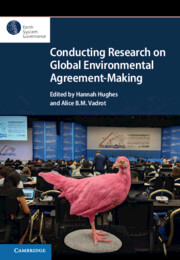Book contents
- Conducting Research on Global Environmental Agreement-Making
- Series page
- Conducting Research on Global Environmental Agreement-Making
- Copyright page
- Dedication
- Contents
- Figures, Tables and Boxes
- Contributors
- Preface
- Acknowledgements
- Abbreviations
- 1 Introduction
- Part I Developing a Methodology
- Part II Navigating Sites
- Part III Collecting and Analysing Data
- 8 Texts
- 9 Interviews
- 10 Ethnography
- 11 Collaboration
- 12 Networks
- Part IV Implementing and Adapting
- Index
- References
10 - Ethnography
From Method to Methodology at Plural Sites of Agreement-Making
from Part III - Collecting and Analysing Data
Published online by Cambridge University Press: 07 August 2023
- Conducting Research on Global Environmental Agreement-Making
- Series page
- Conducting Research on Global Environmental Agreement-Making
- Copyright page
- Dedication
- Contents
- Figures, Tables and Boxes
- Contributors
- Preface
- Acknowledgements
- Abbreviations
- 1 Introduction
- Part I Developing a Methodology
- Part II Navigating Sites
- Part III Collecting and Analysing Data
- 8 Texts
- 9 Interviews
- 10 Ethnography
- 11 Collaboration
- 12 Networks
- Part IV Implementing and Adapting
- Index
- References
Summary
What does it mean to engage ethnography in the study of global environmental politics, particularly at sites of global agreement-making? This chapter explores how different forms of ethnography, including traditional field-based, digital, visual, and spatial approaches, can uncover and interrogate the hidden dynamics that shape the production of global environmental governance. The chapter introduces readers to how ethnographic approaches to these sites have inspired new ways of asking questions about global environmental politics. It considers the opportunities and challenges of adopting transdisciplinary and feminist approaches to ethnography, both in terms of practical concerns in the field and broader disciplinary concerns. It further provides a toolkit for designing ethnographic research with significant attention to the ethical dimensions of ethnography, from project conception through to results communication and data stewardship across the life of the project.
- Type
- Chapter
- Information
- Conducting Research on Global Environmental Agreement-Making , pp. 186 - 209Publisher: Cambridge University PressPrint publication year: 2023
References
Further Reading
References
- 2
- Cited by

